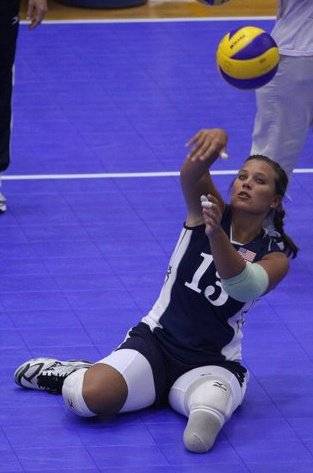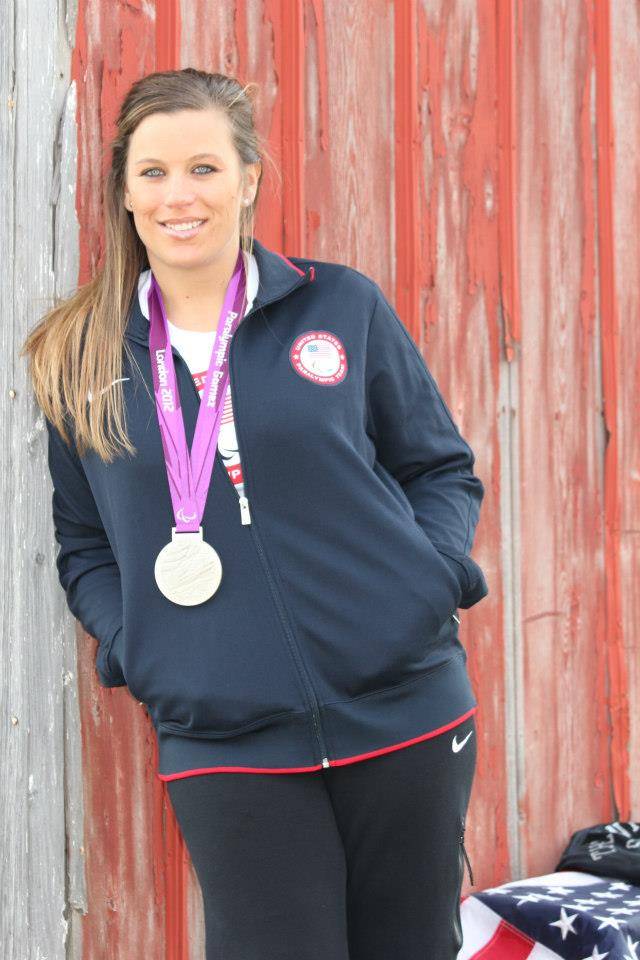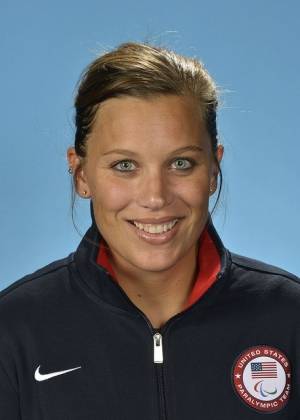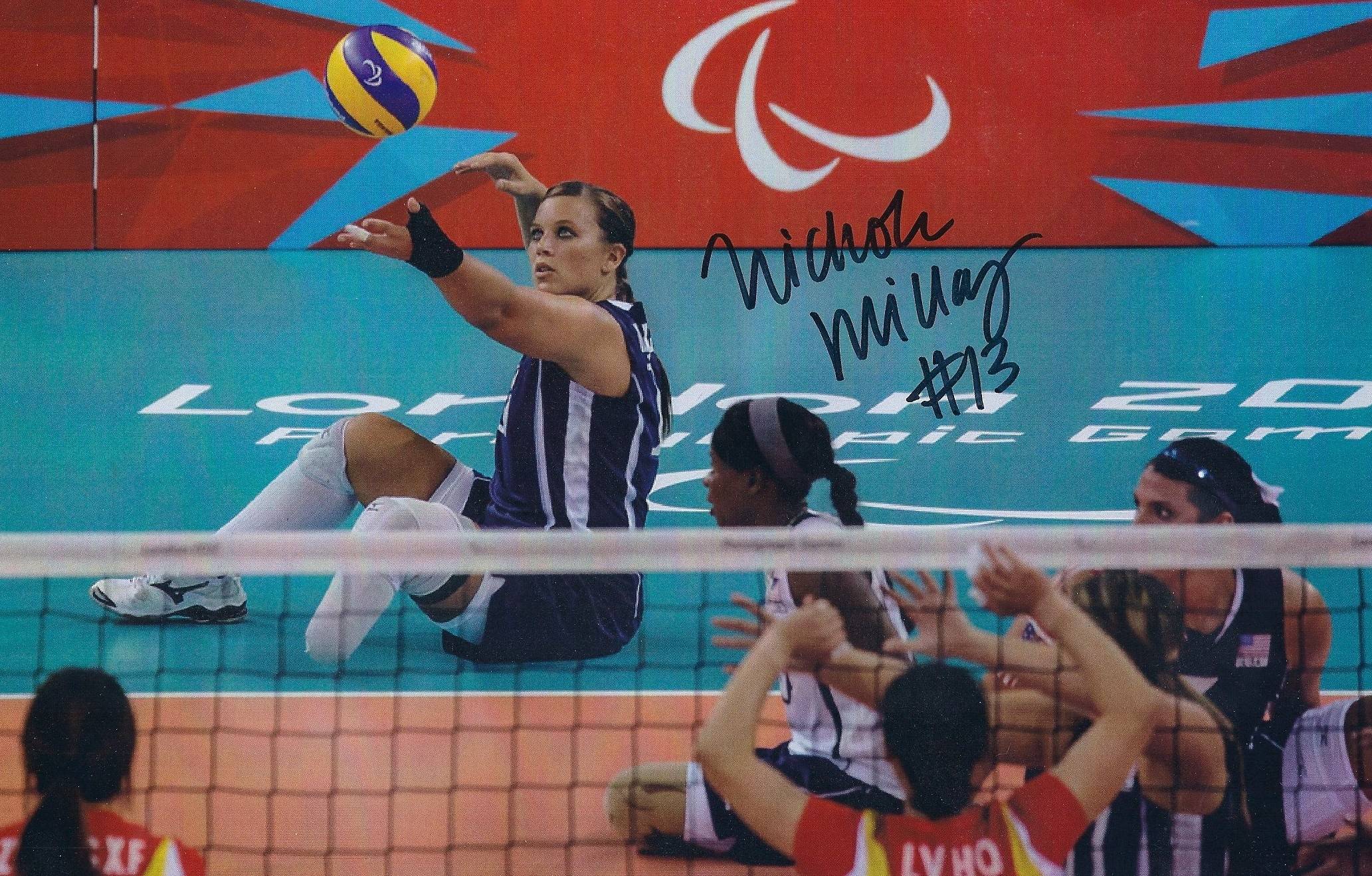Nichole Millage, a native of Champaign, has tasted gold twice as a setter on the USA National Women’s Sitting Volleyball team. In 2008 and 2012, Team USA won silver in matches against China’s sitting volleyball team. In 2016, she is heading to Rio for “unfinished business” with the Chinese National Team and, hopefully, a gold medal.
I spoke with her last week about training for the Paralympics, Team USA’s rivalry with China, and how she is preparing for retirement after Rio.
———
Smile Politely: How did you get involved with sitting volleyball?
Millage: I have been involved in sports for a long time. I played volleyball and softball in high school. I was always on some kind of rec league after that. In 2004, I went to a camp for disabled children, where I was a camp counselor. I was introduced a lot of Paralympic sports there, and sitting volleyball was one of them. They recruited me to come to a training camp and try out for the national team in March 2005, which I did. And I’ve been playing ever since.
In 2007, I moved to Oklahoma to train full time for the national team. Oklahoma is the main training site for sitting volleyball. I lived there for six years. During that time I went back to school and got my bachelor’s and master’s as well.
Now, I’m the oldest member of the team at 38. It’s challenging to be living here and still training, but the city is supportive of what I’m doing.

SP: Tell me about the USA National Women’s Sitting Volleyball team.
Millage: Well, first, to be totally clear about the Paralympics: the Paralympics mirrors the Olympics. It’s held in the same host city, at the same venues, three or so weeks after the Olympics. Everyone who participates in the Paralympics has some kind of physical disability. Almost everyone who plays sitting volleyball is an amputee.
The USA National Women’s Sitting Volleyball team started in 2003, and 2004 was the first year we attended the Paralympics. In 2004, we won a bronze medal, which was surprising at the time since we were such a new team. That helped us get more funding and exposure. We won silver medals in Beijing and London.
At any given time, about half of the national team is training in Oklahoma. Our team consists of about 12-15 girls.
SP: What is the training process for the national team like?
Millage: When I lived in Oklahoma, we trained five days a week every morning for a couple hours. And then there were workout sessions. But for the most part, my days were very free. That’s why I decided to go back to school. If you live there and train full time, they give you a place to live free of charge and also a tuition discount at the University of Central Oklahoma.
Now that I’m based in Champaign, I go to Oklahoma one weekend out of the month to train with the team. I also work here at home with a personal trainer and host sitting volleyball open gyms whenever I can.

SP: What are the disability guidelines for sitting volleyball?
Millage: It’s hard to recruit people for our sport because you’re not only looking for an athlete, but an amputee. There are different classifications for all Paralympics sports. When you go to your first major tournament, you have to go in a room and show what your disability is. Not all sitting volleyball players are amputees, but most are. There are two main classifications: permanents and minimals. For sitting volleyball, a team can have two minimals, and only one minimal can play a time. A minimal is someone who has a disability that is not as extreme. For example, there is a girl on our team who was born with a clubfoot. It was corrected later, but she very little muscle tone in that foot, so she was classified as a minimal.
SP: What were the Paralympics like?
Millage: Beijing was absolutely incredible. They went above and beyond with everything. It’s hard to describe it unless you were there for it. We walked into the bird’s nest and saw 90,000 screaming fans. Knowing that my mom was somewhere in the crowd was pretty awesome. It was so completely overwhelming. You realize you’re part of something that’s much bigger than yourself.
We ended up making it to the final match, which was huge for us because we beat the Netherlands in our semifinal match and we had never beat them in an international tournament. That was thrilling. We felt like we had won gold. But in the final match, China kind of owned us and beat us 0-3. That’s when we realized we still had a lot of work to do. After those games, a lot of us moved to Oklahoma and trained together.
In London four years later—which goes by really fast—we got to the final game again. And that’s no easy feat. A lot of the other teams are awesome, but we were able to edge them out again—barely, in some cases. The final match was USA versus China. We didn’t get creamed that time, but we did lose in four sets. It was heartbreaking. We wanted gold, we could taste gold, but we weren’t quite there as a team.
At that point, I was pretty burned out and decided to move back home. But I knew I still wanted to play because I think we still have unfinished business. I believe that Rio is going to be our turn. We have our world championship games every four years in alternating cycles as the Paralympics. In 2014, we had the world championship game in Poland. We played China again in the final match, and it came down to the final set. But we ended up losing 15-17.

SP: It sounds like you’re getting closer and closer.
Millage: It seems like it. That match was on a silver platter for us to take, and it just slipped away at the very end. I’m fully aware that there are teams that work just as hard as we do and don’t ever take home a medal, and I’m very proud of our silvers, but I think every athlete wants to take home gold. It’s by no means a given that it’s going to happen in Rio. But we know our team is stronger and better than it ever has been right now.
SP: One of the things that is interesting to me about team sports is that the same people encounter each other over and over again in different contexts. Obviously you get to know your teammates very well, personally and in terms of their playing styles, but I’m assuming it’s the same for people on opposing teams. What has it been like to get to know the Chinese team for the past few years?
Millage: That’s one of the cool aspects I was just talking about. In the last 10 years, there are not many people I know who have quit or retired. New athletes have come in, but not many have retired. You see a lot of the same athletes from different countries over and over.
The Chinese team doesn’t speak English, but we still take pictures together and exchange gifts. Lots of other teams that we play regularly do speak English, so we have a closer relationship with them. We will be friendly off the court, though on the court, it’s a totally different story.
SP: Not to bring up a sore subject, but what do you think has made the Chinese team so successful?
Millage: It’s pretty cool to watch them because they have such amazing ball control. They eat, breathe, and sleep volleyball. They’ve been doing it just as long as we have. They aren’t a better team necessarily, but they have taken care of business when they’ve needed to. I’m pretty sure they live together and train together all the time as opposed to just half the team, like we do. They also have one star player, and we’re not really sure what her disability is. She used to be a national team player, and she hurt her knee and somehow got into sitting volleyball and got classified.
But they work just as hard. They deserve everything that happens them. It’s teams like that that challenge you and make you work harder and get better. They make all the teams better.
SP: You mentioned earlier that you’re currently the oldest member on Team USA. Has that given you a particular role on the team?
Millage: It’s interesting because whenever you have any kind of athletic team, you have a team of strong-willed people. You have to find your place. A lot of the younger ones are stepping up and taking on leadership roles. I definitely have my own form of leadership because I have a lot of experience. Some of the girls ask me questions, and it feels good to be able to help them out. But I’ve also sitting back and letting the people who will be taking over the team after Rio figure out the bumps in the road.

SP: What are your thoughts about retiring from your sport?
Millage: Rio will be the last Paralympics for me. I plan on retiring afterward, so I plan on taking every single thing in because I know when it’s over, it will be over. It’s hard to take things in when you’re a young athlete. You get so lost in the moment that it’s hard to appreciate what’s happening. But really, it’s such a small time in your life when this happens. So I want to enjoy every aspect of the trip. I want to appreciate the opportunity that I have. A lot of people don’t get any kind of opportunity like this. I think it’s awesome when I look back on it now, what I’ve been able to do. And I’m still doing it, which I feel very lucky about.
———
Millage was born and raised in Champaign, where she returned after the 2012 London Paralympics. She is an Environmental Sustainability Specialist for the City of Champaign, where she manages the city’s recycling program.








